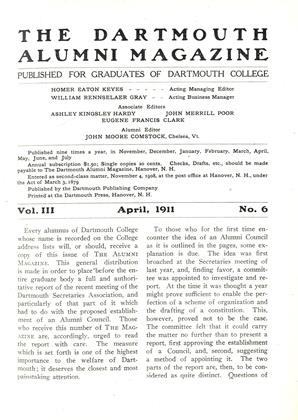whose name is recorded on the College address lists will, or should, receive a copy of this issue of THE ALUMNI MAGAZINE. This general distribution is made in order to place before the entire graduate body a full and authoritative report of the recent meeting of the Dartmouth Secretaries Association, and particularly of that part of it which had to do with the proposed establishment of an Alumni Council. Those who receive this number of THE MAGAZINE are, accordingly, urged to read the report . with care. The measure which is set forth is one of the highest importance to the welfare of Dartmouth; it deserves the closest and most painstaking attention.
To those who for the first time encounter the idea of an Alumni Council as it is outlined in the pages, some explanation is due. The idea was first broached at the Secretaries meeting of last year, and, finding favor, a committee was appointed to investigate and report. At the time it was thought a year might prove sufficient to enable the perfection of a scheme of organization and the drafting of a constitution. This, however, proved not to be the case. The committee felt that it could carry the matter no further than to present a report, first approving the establishment of a Council, and, second, suggesting a method of appointing it. The two parts of the report are, then, to be considered as quite distinct. Questions of ways and means should not be allowed to obscure the larger issue until that is settled on its merits. It will be noted that this was the attitude taken by the Secretaries Association. That body approved the general proposition without committing itself to endorsement of details. The committee having the matter in charge was enlarged and continued in office. It will report to the General Alumni Association at the latter's meeting in June and will recommend action of some kind, preferably the appointment of a committee to cooperate with that representing the Secretaries in the final drafting of a constitution and code of procedure. The process will necessarily be slow, for it involves two im- portant requisites : first,, the alumni must be fully cognizant of what is being attempted ; second, before the Council is finally approved, every circumstance liable to interfere with its successful operation must have been foreseen and removed. THE MAGAZINE will do all in its power to assist in the movement by opening its columns to enquiries or suggestions.
Much has been published with regard to a proposed new system of entrance requirements at Harvard, or rather a proposed new plan of admission. There has doubtless been more or less misapprehension of the plan and some "consequent misstatement. It is, however, clearly and authoritatively outlined in the Harvard Graduates'Magazine for March. At the outset it should be noted that the new plan is not as yet intended as a substitute for that already in operation: it is alternative to it. The course of study in many important schools has for years been adjusted specifically to meet the Harvard requirements ; the arrangement has apparently been satisfactory and there is no demand for a change. On the other hand there are a great many other schools, whose courses are not thus adjusted, yet whose graduates are undoubtedly fitted to enter Harvard. For the benefit of such young men as these the university is prepared to depart from the minute prescriptions hitherto in vogue. A candi- date who can present a satisfactory statement of his school record, the subjects taken, time devoted to them and quality of work accomplished, may offer himself for examination in four subjects only. These are: English; Latin for A.B. candidates; French or German for S.B. candidates; Mathematics or Science, and one other, either Greek or History, or one of the subjects not already selected from the given- list.. What shall be shown on the certificate is not specified; that is left to the school. Just what parts of the subjects in which examinations are given will be treated is not specified; for the aim of the examination will be to test extent and quality of scholarship rather than acquaintance with prescribed texts. The first thought on examining the plan is that of unreserved approval; the next is that of the tremendous difficulties of administration which are involved. And. in the final analysis, the success or failure of any method of admission to college lies less in the method than in its administration.
In the resignation of Professor Frank A. Sherman, the College loses another member of its faculty who, for nearly two generations, has helped to constitute its sturdy foundation. Professor Sherman graduated from Dartmouth in 1870. Previous to this, he had served his country in the Civil War, where he was enrolled in the Union side from August, 1862, to March, 1865. Several times wounded in other engagements, he lost his left arm in the terrible battle of the Wilderness. Upon graduating from Dartmouth, he taught for one year in Worcester Polytechnic Institute, when he was recalled to his alma mater, to whose welfare he has devoted the past forty years of his life. It is a pleasure to know that after his retirement from active duties as a teacher, Professor Sherman will continue to reside in the community of which he has been so long a distinguished and honored member.
 View Full Issue
View Full Issue
















